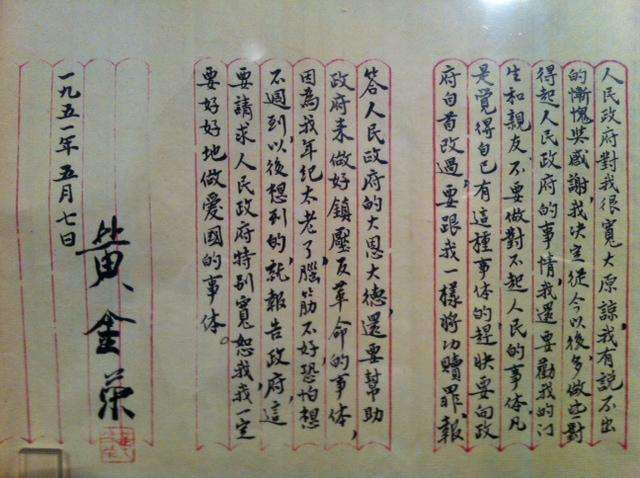
On May 20, 1951, Shanghai's "News Daily" and "Wen Wei Po" published the "Golden Rong Confession Book", which caused a sensation on the beach.
This confession is a "Self-Confession of Repentance" submitted to the Shanghai Municipal Government on May 7 by Jin Jinrong, the former "number one gangster" of Shanghai Beach. In the book, Jin Rong "surrendered himself and reformed", saying that he would "atone for his sins" and "ask the government and the people for forgiveness". The newspaper also published photographs of the elderly and frail Jin Rong sweeping the floor in front of the "Big World" theater.
At that time, many Shanghainese thought that Jin Rong had fled the mainland or had been punished by the people's government. After Jin Rong's book of repentance was published, Shanghai Beach exploded. Many citizens did not expect that this big hooligan was still alive, and they demanded that they "kill Huang". A large number of letters from the masses flew to the government, and people demanded the suppression of the "big hooligan" and "old bully" Jin Rong with bitter hatred, pointing out that Jin Rong's letter of repentance was an understatement, and a few words of remorse could not cover up his accumulated blood debt, demanding that the blood debt must be repaid with blood. In short, "Golden Rong can be killed but not left"! Many former Shanghai gang members have also exposed Jin Rong's crimes and demanded that the party and the government punish the "boss" of the past.
Who is Jin Rong? Jin Jinrong, whose ancestral home is Yuyao, Zhejiang, was born in Suzhou, Jiangsu Province, and entered the Shanghai French Concession patrol house as a "bag inquirer" in his early years, and gradually rose to the position of inspector general. He relied on the forces of the Western powers, adopted gang organizations, recruited disciples, smuggled, gambled, bullied and dominated the market, bought and sold arms and drugs, and plundered the gangster economy. Together with Du Yuesheng and Zhang Xiaolin, he formed the Shanghai gang "Big Three" and planned the underground order in Shanghai. Among them, it is headed by Jin Rong. Politically, Jin Jinrong actively participated in Chiang Kai-shek's "April 12" coup d'état and served as a major general in the National Government and a senator in the Executive Yuan. It is worth mentioning that In 1921, Jin Rong was adopted as a disciple of Chiang Kai-shek, who was at the end of his life in Shanghai. After Chiang Kai-shek flew huang Tengda, Jin Jinrong quietly returned Chiang Kai-shek's protégé post. When New China was founded, Jin Rong was 81 years old and refused to flee to Hong Kong or Taiwan and stayed in Shanghai.
The policy of the Military Control Commission and the People's Government towards Jin Rong is; Honestly accept the transformation, you can not move him first. Considering that gang forces are entangled in the Shanghai area, their large numbers, and the complicated situation, the Military Control Commission made such a decision based on maintaining social stability.
Therefore, Jin Rong's life is relatively comfortable, insisting on smoking a big cigarette, rubbing mahjong, and going to the bathhouse every day. Although his mansion was greatly neglected, there were people coming and going one after another, and it was normal to open five or six meals a day to leave people to eat. Economically, Golden Rong also maintains several properties and charges a considerable amount of rent per month. Compared with Du Yuesheng, who fled to Hong Kong and could only listen to Peking Opera oratorios every day, Jin Jinrong's situation was much better.
In early 1951, the suppression of counter-revolutionaries was launched throughout the country. The days of Golden Glory became sad. Shanghai citizens have demanded that Jin Rong be brought to justice, and even some people spontaneously flocked to the door of the Huang Mansion to provoke him to come out and criticize the fight. The public security organs and the municipal government felt that JinRong should publicly express his attitude, apologize to the people, and accept the people's judgment. Therefore, the Shanghai Municipal Government summoned Jin Jinrong and explained to him that the previous policy remained unchanged, but hoped that he could write a "letter of repentance" and publish it in the newspaper and publicly confess his guilt. So there was the opening scene.
Despite the controversy over the confession, the confession has had a positive effect. In addition to publicly confessing his guilt, Jin Jinrong also publicly admonished his disciples and grandchildren to seriously reform and serve the people, which played a deterrent effect on the gang forces in Shanghai. Out of the needs of the united front, the municipal government downplayed some of the "situations" in Jin Jinrong's "letter of repentance", conveying a positive signal to the old Shanghai figures in exile. Du Yuesheng, another gangster tycoon who stayed in Hong Kong, studied the remorse of his "accomplices" word for word, found signs of leniency, and once had the idea of returning to Shanghai.
The "big world" is the industry occupied by Jin Rong, and the gang leaders in Shanghai Beach used to sing and dance in it, drunkenly dreaming and dying, and now it has ironically become the labor transformation place of Jin Rong. Considering the repercussions at home and abroad, and considering that Jin Jinrong is already an old man in his 80s, the sweeping work that the people's government has made him in front of the "big world" is only a temporary measure and has not lasted.
On June 20, 1953, Jin Rong died of illness in Shanghai. Du Yuesheng, who was 20 years younger than him, died in Hong Kong on August 16, 1951. The gangster era on the beach has completely entered history with the death of the two, and now it exists more in film and television works.